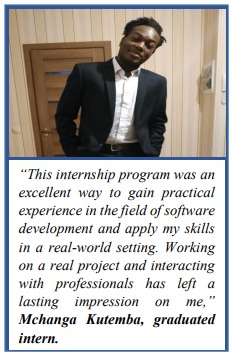
“The internship opportunity as a Junior Software Developer under the USAID eSCMIS project kick-started my career in ICT. The internship boosted my confidence and gave me the courage to continue exploring the world of ICT. During my internship, I learned about relevant software and technologies, how to use them and how to solve end-user problems, among other skills. Also, through this internship, I came to the realization that despite being a male dominated field, females can also excel in software development if they are dedicated and have the right people to guide them. The project laid a strong foundation for me and I am proud to have contributed to the eLMIS system which is saving lives in health facilities across the country,” Kashiya Mwape, graduated intern.
Software development has been a growing field of industry for years over the last two decades, Software development for health, on the other hand, is relatively new – growing in some regions, and unformed in others. It is advanced in settings like Kenya, Ethiopia and India, whereas Zambia is in an early phase.
The USAID Electronic Supply Chain Management Information System (eSCMIS) project is a digital solution to supply chain management for health. The project envisions a health logistics system that is automated from procurement at national level, to client dispensation at the facility level, with an architecture that is adapted to Zambia’s health logistics system. This system is reliant on software developers to not only create but iterate – to grow its use and effectiveness across the over 2,600 health facilities it serves.
To date, the USAID eSCMIS project has been incredibly effective at managing the supply chain information for health in Zambia. Creating real-time data to inform stock decisions and to deliver quick access to products needed. It customizes delivery based on demand and offers real-time data on product batch expiry and quality – giving health facilities certainty around the quality of products they’re using to treat patients, while also reducing wastage and associated cost on a national level.
The USAID eSCMIS project has a personal stake in growing a community in software development for health to sustainably maintain this high functioning digital solution in Zambia. Skills building in software development and software maintenance is also an area where many young professionals aim to develop skills, which can offer them growing career opportunities.

“We realized we had an opportunity to not just create a digital health solution for the global good, but invest in a community of software developers to learn to code, develop, and maintain this system. Those skills could offer them greater economic advancement and career opportunities. They would also be available sources of support to the Ministry of Health as Zambia takes complete ownership of this system” – Wendy Bomett, JSI’s Director for Management Information Systems on the USAID eSCMIS project.
The project began investing in a 6-month internship program and is in its third cohort of that program. To date, those cohorts of about 2-4 interns have included mostly women – intentionally recruited to ensure their growth in STEM career opportunities. In the 6-month span, interns get up to speed on how to code and iterate on an open source system. They then put those skills to use adapting this management tool to the evolving supply chain demands of the Zambian health system.
Ensuring sustainability of this system, creating a locally-grown Zambian workforce of software developers, and creating a community of developers for health that the Zambian ministry can tap into in the future has become the merged effect of this investment.
“We now have a broader community that understands basic logistics, data structure and coding and they can come in and code when an innovation comes to mind. It’s open source. If they want to hop in and write code to progress this supply chain solution, lead developers will publish their work, attributing it to them.” Continues Bomett “We have these relationships now. And they have these skills: every single one of them has moved on to an exciting job opportunity – they’re going wherever their career takes them now but they will always have a home here, too.”

